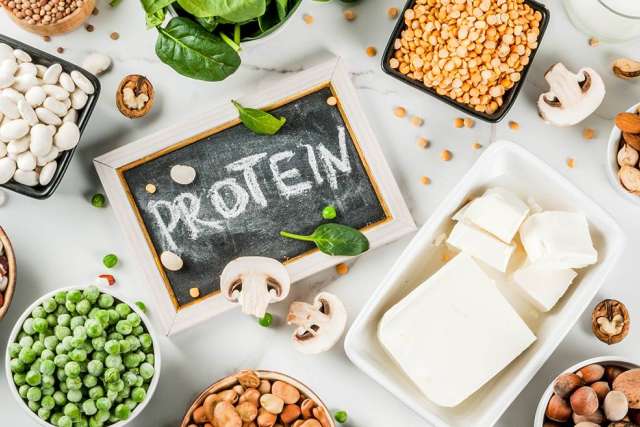Many people consider animals as the main source of dietary protein, but plant-based protein consumption is rising in popularity. In 2020, 28% of Americans reported eating more protein from plant sources than they did in 2019, according to the International Food Information Council’s (IFIC) 2020 Food & Health Survey.
So why the sudden shift to plant-based protein? One reason, according to UCLA Health senior dietitian Dana Hunnes, PhD, MPH, RD, is that people are realizing plants serve as a good source of protein and offer substantial health benefits.
“When it comes to your body’s daily function, it doesn’t matter where you get your protein from,” Dr. Hunnes says. “But data show that eating fewer animal products and more plant-based proteins is associated with increased longevity and decreased morbidity.”
If you’re considering adding plant-based protein to your diet, Dr. Hunnes weighs in with what you need to know:
Your daily intake of protein is the same whether it comes from plants or animals
Protein is a vital part of a healthy diet. It plays a role in most bodily functions, from cell repair and hormone production to muscle building and blood clotting. For your body to operate as it should, you need an adequate amount of protein from food.
To determine your recommended daily amount of protein, multiply your weight in pounds by 0.36. Then use that amount as a guideline, regardless of the protein source. (People who are pregnant or breastfeeding and athletes may need more protein and should consult a doctor.)
“It doesn’t matter if you get the grams of protein from plant protein, such as beans or whole grains, or if you get them from animal products,” Dr. Hunnes says. She also explains that simply eating a healthy diet should make the target number easy to hit. “As long as you’re getting enough calories, there’s a 99.9% chance that you’re getting enough protein, whether it’s coming from plants or not.”
Plants provide the essential amino acids you need
Quantity of protein is only half the battle – quality plays a role too. We rely on the protein in food to get the nine essential amino acids our bodies need. While meat is a “complete” protein because it contains all the essentials, Dr. Hunnes says that eating a variety of plant proteins provides the same result in a healthier package.
“By eating a wide complement of plant-based protein, you’ll get every essential amino acid that your body needs,” she says. “It’s always better to eat a wide variety than to just stick with one type.”
Good sources of plant-based protein include:
- Beans and legumes, which are also high in fiber
- Grains, including oats, farro, barley or quinoa
- Lentils, easily added to soups, curries, tacos or salads
- Nuts and seeds, with peanuts and sunflower seeds packing the most protein
- Soy, eaten as edamame, tofu, tempeh or whole
Plant-based protein decreases the risk of chronic diseases
While some lean meats can be good sources of protein, the American Heart Association reports that eating less meat decreases the risk of:
- Heart disease
- High blood pressure (hypertension)
- High cholesterol
- Many cancers
- Obesity
- Stroke
- Type 2 diabetes
“Animal proteins, especially red and processed meats, are associated with inflammation caused by saturated fat,” Dr. Hunnes says. Inflammation is your body’s natural response to protect itself from threats. While occasional inflammation isn’t detrimental, chronic inflammation has been linked to many serious conditions, such as diabetes, cardiovascular disease and arthritis.
The added fiber in plants promotes good gut bacteria
A big benefit to plant-based protein is the fiber it provides. Fiber helps regulate the body’s sugar use, keeps hunger and blood sugar in check, and helps food move through the digestive system with regularity.
“When you eat more fiber, the microbiome and the good bacteria in your gut actually change, creating a healthier environment,” Dr. Hunnes says. She warns there is potential for some gassiness when adding more fiber, but it quickly subsides after a week or two.
You can benefit from plant protein even if you still eat some meat
You don’t need to become a vegetarian to get the benefits of plant-based protein. But according to Dr. Hunnes, the more plant-based protein you consume, the better off you’ll be.
“You’ll definitely get some benefit from substituting plant protein for animal protein, and that’s a good place to start,” Dr. Hunnes says. “It does not have to be all or nothing, but the benefit is directly related to the amount of plant-based protein you eat in place of animal protein.”
To ease the transition to a plant-based diet, Dr. Hunnes suggests using familiar spices and choosing foods, such as tofu or legumes, that have a firm texture similar to meat. She also recommends trying many different plant protein sources.
“Just like anything in nutrition, you should vary your diet and the sources of your plant protein,” she says. “That way, you’ll learn what you like and get a whole host of other nutrients that your body needs.”
Before you make any big dietary changes or to learn more about whether plant-based protein is right for you, talk to your primary care provider.



